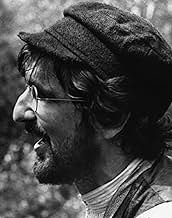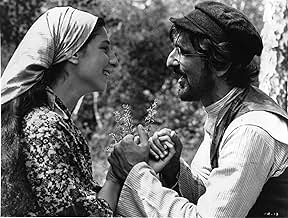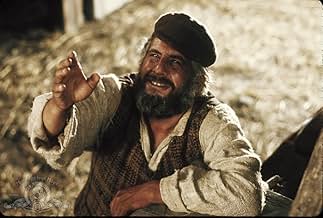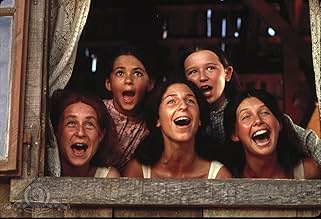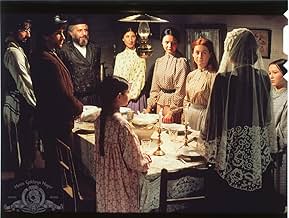Im vorrevolutionären Russland kämpft ein jüdischer Bauer damit, drei seiner Töchter zu verheiraten, während wachsende antisemitische Gefühle sein Dorf bedrohen.Im vorrevolutionären Russland kämpft ein jüdischer Bauer damit, drei seiner Töchter zu verheiraten, während wachsende antisemitische Gefühle sein Dorf bedrohen.Im vorrevolutionären Russland kämpft ein jüdischer Bauer damit, drei seiner Töchter zu verheiraten, während wachsende antisemitische Gefühle sein Dorf bedrohen.
- 3 Oscars gewonnen
- 10 Gewinne & 14 Nominierungen insgesamt
Paul Michael Glaser
- Perchik
- (as Michael Glaser)
Ray Lovelock
- Fyedka
- (as Raymond Lovelock)
Empfohlene Bewertungen
The story took place in the village of Russia, 1904. It centered around the leading role, Tevya, who was diaryman. Tevya was a enlightened old man, he had open-minded thought and he deeply loved his three daughters. When he looked into the future of the daughters who were unmarried, he always sang the song "If I am the rich" very kindly, because he fervently expected that they got a bright future.
In the beginning, Tevya was trying to marry off Tzietel, the oldest daughter. The matchmaker found her a matcher in Lazar Wolfm the butcher. However, the butcher was much older than Tzietel, and she didn't love him. she loved a poor tailor, and they promised to each other that they would get married. At last Tevya said yes to them. Meanwhile the second child Hodel, and a poor student also fell in love soon, and they got engaged. They informed her father this and he gave them permission to be married. The poor student was arrested for demonstrating, and was sent to a distant prison, Hodel left to join there. Last, the last daughter , Chava and Fyedka fell in love. Chava told Tevya, and he was outraged, because she wanted to marry out of the faith. She got married anyway, and Tevya disowned her. Soon after that, all of the Jewish people in Anatevka got a notice to move out. And that's the end of the play. Ir's a kind of sad ending.
In the beginning, Tevya was trying to marry off Tzietel, the oldest daughter. The matchmaker found her a matcher in Lazar Wolfm the butcher. However, the butcher was much older than Tzietel, and she didn't love him. she loved a poor tailor, and they promised to each other that they would get married. At last Tevya said yes to them. Meanwhile the second child Hodel, and a poor student also fell in love soon, and they got engaged. They informed her father this and he gave them permission to be married. The poor student was arrested for demonstrating, and was sent to a distant prison, Hodel left to join there. Last, the last daughter , Chava and Fyedka fell in love. Chava told Tevya, and he was outraged, because she wanted to marry out of the faith. She got married anyway, and Tevya disowned her. Soon after that, all of the Jewish people in Anatevka got a notice to move out. And that's the end of the play. Ir's a kind of sad ending.
I LOVE this musical but I weep a little always for the Yiddish culture lost forever. The world is so much poorer.
I apologise for straying from the artistic merit to linger on the loss to Humanity
Nevertheless this film is a permanent record of the fact that we enjoyed a wondrous Yiddish culture in our midst in Europe but after a series of Pogroms culminating in the Holocaust the heart was ripped out of our culture here in Europe
The music, the humour, the humanity, gone forever from the Heart of Europa. Europe's loss
Irish Gentile
I apologise for straying from the artistic merit to linger on the loss to Humanity
Nevertheless this film is a permanent record of the fact that we enjoyed a wondrous Yiddish culture in our midst in Europe but after a series of Pogroms culminating in the Holocaust the heart was ripped out of our culture here in Europe
The music, the humour, the humanity, gone forever from the Heart of Europa. Europe's loss
Irish Gentile
"Fiddler On the Roof" is the stage-to-screen adaptation of the famous musical. It tells the story of Tevye, a poor Jewish milkman in the tiny Russian village of Anatevka. This role is played by Topol, who played the character onstage in the London production of "Fiddler." We see him as a man mired in traditions, but struggling between his devout faith and the changing times when three of his daughters feel the urge to marry. The movie is beautifully shot, and tempers the story, which deals with the harsh realities of Jewish life in pre-Revolutionary Russia, with classic musical numbers sure to put a smile on your face. Between its incarnations on the stage and on screen, "Fiddler" will be immortal.
In pre-revolutionary Russia, a poor Jewish peasant (Topol) must contend with marrying off his three daughters while antisemitic sentiment threatens his home.
Let me say this right of the bat: while this film may focus on a Jewish family and their struggle to enter the modern world (which may be good or bad), you certainly do not need to be Jewish to enjoy it. I always felt like this film (and "Yentl") were marketed towards the Jewish community, but it need not be. It is just a great story with excellent songs.
I loved the singing, the dancing, the story, the humor, the characters... there was really nothing I disliked about it. I was a bit surprised the eldest daughter was not Barbra Streisand, because they look identical. But, oh well. And I am also a bit surprised that the director was not Jewish, especially with a name like Jewison... but hey, he did a marvelous job!
Let me say this right of the bat: while this film may focus on a Jewish family and their struggle to enter the modern world (which may be good or bad), you certainly do not need to be Jewish to enjoy it. I always felt like this film (and "Yentl") were marketed towards the Jewish community, but it need not be. It is just a great story with excellent songs.
I loved the singing, the dancing, the story, the humor, the characters... there was really nothing I disliked about it. I was a bit surprised the eldest daughter was not Barbra Streisand, because they look identical. But, oh well. And I am also a bit surprised that the director was not Jewish, especially with a name like Jewison... but hey, he did a marvelous job!
Rarely a film so authentic. I saw several movies by Norman Jewison, Moonstruck(1987), ... and justice for all.(1979), F.I.S.T.(1978), Rollerball(1975), The Cincinnati Kid(1965), Bogus(1996), Other People's Money(1991), Only You(1994). I saw also two masterpieces by the same Norman Jewison: Jesus Christ Superstar(1973) and In the Heat of the Night(1967). Fiddler on the Roof(1971) it's his most successful and fulfilled film, in my opinion. The actors are downright amazing: Topol, Norma Crane, Leonard Frey, Molly Picon, Paul Mann, Rosalind Harris (exceptional), Michele Marsh, Neva Small. The music is very beautiful. There are many movies which lasts only 90 minutes, but you want to finish faster, they are so bad; Fiddler on the Roof it lasts 180 minutes, but you do not want to end.
Wusstest du schon
- WissenswertesThe "Sunrise, Sunset" scene was not lit by electric movie lights but by hundreds of candles, by Cinematographer Ossie Morris. Years later, Norman Jewison said it was the best lit scene in any of his films.
- PatzerWhen the old man is talking to Tevye about Tzeitel, the shadow of the microphone boom is visible on the old man's shirt.
- Crazy CreditsTopol and the cast sing "Tradition" without any opening credits rolling. At the end of the number, the fiddler standing on the left of the screen launches into an extensive solo while the opening credits roll on the right of the screen.
- Alternative VersionenOriginally released at 181 minutes (with an intermission); later trimmed for 1979 reissue to 149 minutes.
- VerbindungenEdited into 5 Second Movies: Fiddler on the Roof (2008)
- SoundtracksTradition
(1964) (uncredited)
Music by Jerry Bock
Lyrics by Sheldon Harnick
Performed by Topol and Chorus in the pre-credits sequence
Top-Auswahl
Melde dich zum Bewerten an und greife auf die Watchlist für personalisierte Empfehlungen zu.
Details
- Erscheinungsdatum
- Herkunftsland
- Sprachen
- Auch bekannt als
- Violinista en el tejado
- Drehorte
- Lekenik, Kroatien(Anatevka)
- Produktionsfirmen
- Weitere beteiligte Unternehmen bei IMDbPro anzeigen
Box Office
- Budget
- 9.000.000 $ (geschätzt)
- Bruttoertrag in den USA und Kanada
- 10.404.330 $
- Eröffnungswochenende in den USA und in Kanada
- 1.726.942 $
- 11. Nov. 1979
- Weltweiter Bruttoertrag
- 10.407.890 $
- Laufzeit
- 3 Std. 1 Min.(181 min)
- Farbe
- Seitenverhältnis
- 2.35 : 1
Zu dieser Seite beitragen
Bearbeitung vorschlagen oder fehlenden Inhalt hinzufügen






